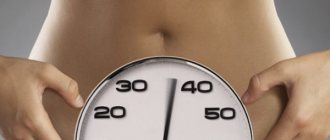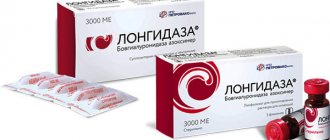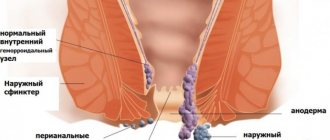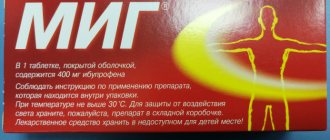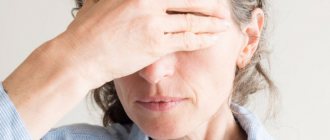What is menopause
To understand this, you need to delve a little deeper into anatomy and remember that women have ovaries.
These internal genital organs produce eggs and hormones that are needed for the successful fertilization of these same eggs. In childhood, the ovaries do not perform their functions 100% and are simply a warehouse of germ cells, which is given to a woman once during intrauterine development. When puberty begins (it’s different for everyone, around 13–16 years), the ovaries begin to work at full capacity. The menstrual cycle appears - the monthly (approximately) maturation and death (or fertilization) of one egg.
This goes on for many years until menopause or menopause comes - it’s the same thing. The ovaries stop producing eggs and hormones, menstruation stops, unpleasant symptoms appear that need to be dealt with, sometimes for quite a long time.
Why and when does menopause occur?
As we have already said, the main reason for menopause is a change in hormonal levels, because the ovaries stop working. This usually happens at the age of 45–55 Patient education: Menopause (Beyond the Basics) or a little later, when the body thinks that a woman no longer needs to produce offspring - it would be too tiring. (Unfortunately, the ovaries are not aware of the modern rhythm of life, realities and medical possibilities, otherwise they would not be lazy.)
Sometimes menopause occurs earlier. This happens due to the characteristics of the body or due to surgery if the woman had to have her ovaries removed.
Causes of menopause
Menopause is directly related to the general restructuring of the body after 45-55 years. At this age, a woman, from the point of view of nature, should no longer be concerned with giving birth to children. Therefore, the functioning of the reproductive system changes and, most importantly, the production of sex hormones estrogen decreases. However, they regulate not only the ability to get pregnant, but also other functions. A decrease in estrogen in the body leads to such unpleasant symptoms of menopause as hot flashes, an unbalanced emotional state, night sweats, dryness and itching in the vagina, etc. In addition, your appearance deteriorates, wrinkles appear, and excess weight may appear. Some of these symptoms go away over time, while others get worse.
How to understand that menopause has arrived
The main symptom of menopause is the absence of menstruation. As a rule, changes in the cycle begin several months before it stops completely, so menopause is divided into three periods:
- Perimenopause is precisely the period of time when menstruation begins to change its schedule.
- Menopause is 12 months from the last menstrual period.
- Postmenopause - the rest of the time.
After menopause, a woman can no longer become pregnant naturally. But you can give up contraceptives no earlier than a year after your last menstruation.
Causes of menopause
The onset of menopause usually occurs at the age of 50-55, but women also experience early menopause - after 40 years. The entire period lasts on average 10-15 years.
Doctors distinguish three stages of menopause:
- Premenopause begins 4-5 years before menopause. The functions of the ovaries begin to fade, the production of progesterone, which is responsible for menstruation, decreases, and periods become irregular. Metabolism slows down, and it becomes more difficult to maintain a slim figure, especially around the waist.
- Menopause occurs one year after the last menstruation and lasts 1-2 years. Progesterone and estrogen levels are close to zero, which leads to hormonal imbalance. The process of irreversible changes in the body begins. The level of estrogen (they are responsible for the formation of bone tissue) decreases sharply during menopause. Lack of estrogen leads to the development of osteoporosis in women, the accumulation of “bad” cholesterol in the blood. The skin, which is very frustrating for the fair sex, becomes covered with wrinkles. With low progesterone production, the endometrium in the uterus becomes thinner, which can give impetus to the development of a malignant tumor. The lack of progesterone also affects the normal functioning of the nervous system.
- Postmenopause is the last stage of menopause and lasts from 3 to 15 years. The reproductive activity of the ovaries completely stops and further age-related changes occur, chronic diseases worsen, and immunity decreases.
The cause of menopause is a decrease in the production of female sex hormones, which gradually reduces a woman’s ability to bear children. This is a natural process that you need to treat as the next stage in your life.
But the onset of menopause sometimes occurs much earlier.
The causes of early menopause may be:
- chronic ovarian diseases;
- genetic predisposition;
- decreased sexual activity;
- surgical removal of the ovaries.
Bad habits (alcohol and smoking) also negatively affect the production of sex hormones, which brings menopause closer by several years.
To feel great during this difficult period and continue to enjoy life, you can follow some recommendations.
Preparation includes:
- after 40 years, regularly undergo examination by a gynecologist;
- Discuss with your doctor the advisability of hormonal therapy;
- check your blood cholesterol levels periodically and keep this indicator under control;
- take a blood sugar test to find out if you have latent diabetes;
- check your blood pressure from time to time;
- do an ultrasound of bone density to detect early forms of osteoporosis;
- control your weight by not allowing yourself to eat flour, fatty foods, and sweets;
- Do a mammogram at least once a year and perform breast self-monitoring.
Since hormonal changes in a woman’s body begin to occur several years before menopause occurs, you need to start preventing rejuvenation from the age of 35-37. Proper nutrition, exercise, constant monitoring by a gynecologist and a positive attitude towards the world will help delay the onset of menopause for 5-10 years.
What are the symptoms of menopause?
There is no need to treat menopause; it is one of the natural states of the female body. But along with changes in hormonal levels come unpleasant symptoms of Menopause. Symptoms:
- Feeling of hot flashes (hot flashes).
- Night sweats.
- Vaginal dryness.
- Sleep problems.
- Mood swings.
- Decreased libido.
- Urinary incontinence.
Sometimes these symptoms appear when there are no changes in the menstrual cycle yet. They can foreshadow menopause several months or even years before its onset.
You won't have to live with these symptoms for the rest of your life, but they can last up to 12 years. The Treatment of Climacteric Symptoms.
Although in most cases menopause does not require treatment, certain symptoms can make life very difficult. However, they are amenable to hormonal and non-hormonal therapy.
Menopause: accept or win?
How many times has each of us, in an attempt to “raise” our children, do everything at work, without forgetting about everyday worries, wondered when I will finally be able to live for myself? And now, the long-awaited time has come - the children have grown up, the woman has established herself as a specialist, and in the management of everyday life she has no equal, everything is done “with a light hand” as if by itself. It is at this moment that a woman meets a new, free stage of her life, which, as a rule, is accompanied by such an unpleasant phenomenon for each of us as menopause. Its frequent companions are headaches, increased fatigue, and depression. Discomfort increases the negative impact of the environment: poor ecology, work pressure, stress. However, the problem lies not so much in the symptoms themselves, which, of course, cause certain inconvenience, but in the disruption of metabolic processes in a woman’s body. These changes can lead to heart attack, stroke, osteoporosis and other diseases.
Preventing the onset of menopause is a fairly relevant topic. Modern ideas about a woman over 40 have stepped far forward: we must always be in shape, look good, and be on time everywhere. And we no longer want to put up with illnesses during the period of our professional and life heyday. After all, none of us want that after 40 years the skin loses its elasticity, wrinkles suddenly appear, the condition of the hair worsens, problems with the menstrual cycle appear, and then irritability, hot flashes, increased sweating, rapid heartbeat and surges in blood pressure. But there is no need to panic. Each of us has the power to minimize both the manifestations of menopause and its negative consequences.
Climax translated from Greek means “step”. The founder of Intimate gymnastics in Russia and other countries of the world, physical therapy instructor, Guinness Book record holder Tatyana Kozhevnikova spoke about how to rise to this next step in life with your head held high.
First, let's answer the question: what are we dealing with?
During menopause, a woman's body undergoes a radical restructuring of the hormonal system. Modern medicine identifies three main stages of this process.
The first stage is premenopause, which can occur after forty years. Your periods become irregular, less frequent or more frequent than usual. This is due to a decrease in the production of gestagen, the hormone responsible for menstruation. During this period, a woman may experience hot flashes, increased sweating, drowsiness, fatigue and irritability, and panic attacks. The duration of premenopause varies from person to person; it usually ranges from two to eight years.
The second stage is menopause. It is characterized by the cessation of menstruation and their absence for a long time, for example, a year. During this period, the level of estrogen in a woman’s body completely decreases, which can cause vaginal dryness, urinary incontinence, and general discomfort in the genital area.
Menopause is followed by the third stage - postmenopause. Due to the cessation of estrogen production, it is during this period that the consequences associated with metabolic disorders can become especially acute.
According to medical criteria, the onset of menopause is considered to be the norm in the period from 44 to 52 years.
Troubled period or elegant age?
Just as each woman is individual, menopause also occurs differently for each representative of the fair sex. According to statistics, every tenth person practically does not notice this period.
However, this does not mean that hormonal changes have stopped. In addition to the gradual cessation of estrogen production in a woman’s body, the level of luteinizing hormone, gonadotropin and follicle-stimulating hormone increases. These changes affect the skeletal and vascular systems - there may be a predisposition to osteoporosis, increased cholesterol levels, and problems in the genitourinary system, such as urinary incontinence and inflammatory processes.
Currently, there are several approaches to the treatment of menopause: the doctor can prescribe both drug treatment of individual symptoms and hormone replacement therapy. However, it should be noted that doctors recommend using hormonal drugs in minimal doses and for as short a time as possible, since these drugs increase the risk of developing breast cancer and heart disease (heart attack and thrombosis), and also have serious side effects. Tatyana Kozhevnikova suggests using the body’s internal resources in addition to medications. According to her, a woman can not only minimize the manifestations and consequences of menopause, but also delay its onset, and in the future completely abandon hormonal therapy.
Now we can talk about such a phenomenon as early menopause, which can occur in a woman as early as 35 years old. The most important reason is stress, which results in hormonal disruption and the cessation of menstruation. Stress comes from dissatisfaction with one’s sex life and from unsettlement. Tatyana Kozhevnikova’s gymnastics helps relieve stress, and, as a result, a woman’s monthly cycle is restored, she blossoms again, radiates sexuality, becomes orgasmic, is always in demand by men, her vital energy is strong, which allows her to achieve success in everything.
What is Tatyana Kozhevnikova’s technique?
A well-chosen system of exercises and their technically correct implementation give quick results. The main thing is to teach a woman to feel and properly control her intimate muscles, to contract exactly those that are needed, and to strengthen the uterine muscle. Regular exercises for intimate muscles can significantly tighten them, improve blood circulation in all nearby organs, normalize hormonal levels, and prolong youth, which is especially important when menopause occurs. This is the master's secret.
Here are the advantages of her technique that Tatyana talks about:
- when practicing intimate gymnastics, early menopause does not occur;
- the vaginal mucosa is of high quality, there is no dryness, since when performing a set of exercises, the ovaries and adrenal glands begin to intensively produce hormones that make the vagina moist;
- a woman does not experience irritability and stress, since the adrenal glands, which are responsible for vital and sexual energy, are working;
- a woman looks young thanks to the activity of the youth hormone - estrogen;
- metabolic processes in the body improve, as a result of which a woman’s body becomes toned and age-related sagging skin goes away;
- a woman is active in sex, as she has vivid orgasms and a desire to have sex as in her youth;
- The functioning of the thyroid gland improves, gynecological health is restored: fibroids, fibroids, endometriosis, adhesions, incontinence, hemorrhoids disappear and, of course, the ligaments and walls of the pelvic floor muscles are strengthened. In 1 month of classes, prolapses of the first degree disappear, and in 3 months of regular classes, prolapses of the second and third degrees disappear.
Tatyana Kozhevnikova uses her patented forms of simulators, which are easy to use, when training intimate muscles. And the woman perfectly feels how to control her intimate muscles with its help. There are three types of simulators, which have different shapes and complement each other. They are used to develop muscle strength, strengthen and improve the elasticity of the ligaments and muscles of the vagina, for orgasms, and to quickly fill the uterus with energy. A woman with an empty uterus is not interesting to a man, as she always feels vital and sexual weakness. The uterus can only be filled through physical exercise, and by pumping it up, you will be filled with energy and will always radiate joy and sexuality. If you have had your genitals removed, you can and should exercise, since the adrenal glands take over the work of the uterus and ovaries.
Those around you will strive to be near you and imitate you . You will have many creative thoughts, your dreams will quickly come true, because the more energy you emit, the more what you want will be attracted you Everyone knows this law, but not everyone knows how to quickly fill up with energy. So, this can be done by performing intimate gymnastics according to Tatyana’s method. Try it, and in just 5-6 sessions of 20-30 minutes each you will notice colossal results.
Tatyana Kozhevnikova is the only one in the world who has created a set of exercises that have a coordinated effect on women’s hormonal levels, strengthening intimate muscles, restoring the psycho-emotional state and quickly filling them with vital energy through physical, energetic, and meditative exercises, which have no analogues. This system has been created for more than 25 years. Exercise and be healthy, maintaining youth and a full life for many years to come. And remember that only a sensual, orgasmic and energy-filled woman is happy and successful in everything.
Intimate gymnastics should be done at any age, especially for those over 40!
How to use hormones during menopause
Hormone therapy for menopause is good because it usually helps eliminate several symptoms at once. To treat incontinence, hot flashes, vaginal dryness and other problems, medications that contain estrogen (estradiol) are used - this is the hormone that the ovaries stop producing. Patient education: Menopausal hormone therapy (Beyond the Basics) . Most women (who have not had their uterus removed) also require a progestin.
Many combined oral contraceptives contain both of these hormones. In addition, hormonal medications are available in the form of patches, vaginal rings and creams, even intrauterine devices.
With such an abundance of options, the question of dosage and rules of administration is decided only by the doctor.
In addition, hormonal therapy has its own contraindications and side effects. They are individual and are also discussed when choosing a drug.
If for some reason hormonal therapy cannot be used, other means are used to alleviate the main symptoms of menopause. For each symptom there are its own recipes.
About hormones
No. 1. They promote fullness.
Is it so? On the contrary, if the extra pounds are caused not by overeating, but by hormonal changes, then taking them will help you get back into shape. After all, when a woman’s ovaries, which synthesize estrogen, stop functioning, female hormones begin to be produced in the subcutaneous fatty tissue. This is precisely what explains weight gain - “not from cutlets, but from years.”
Although, to understand the mechanism of excess weight, you need to undergo other studies.
Favorable climate. How the psychological state affects menopause Read more
#2: Long-term use of hormones increases the risk of cancer.
Is it so? Estrogens themselves do not cause cancer, but if the synthesis of tumor cells has already started in the body, then hormonal therapy provokes their growth. Therefore, even if a woman has benign formations in her body, it is better to refrain from taking hormones.
At one time it was believed that long-term (more than 10 years) use of MHT drugs could provoke the development of cancer of the reproductive organs, but today scientists around the world have revised their views and abolished these restrictions.
Nevertheless, in Russia they are still wary of long-term use of hormones. We consider it optimal to start taking them from the very beginning of menopause, or at least no later than 2-3 years after the last menstruation.
Article on the topic
Humidity is low. Causes of vaginal dryness
No. 3. If there are no contraindications to taking hormones, you can take them without worrying about anything.
Is it so? When taking MHT drugs, it is necessary to undergo regular examination. And most importantly, be under the supervision of a specialist. Take a blood clotting test every 3 months. Do a pelvic ultrasound twice a year, annually a mammogram and a gynecological smear from the cervix for cytology, ultrasound of the abdominal cavity and others.
#4: Herbal remedies, antidepressants and homeopathy are as effective as hormones.
Is it so? Medicines containing extracts from estrogen-like plants (cohosh, clover, soy), serotonin reuptake drugs (antidepressants), as well as placenta extract-based products and drugs containing melatonin only slightly reduce the intensity of hot flashes. But they will not protect against distant manifestations of menopause. Therefore, women for whom MHT is contraindicated are prescribed special drugs to restore bone mineral density for the prevention and treatment of osteoporosis. Urogenital disorders in the absence of contraindications (previous pelvic cancer) can be combated with the help of local estrogen forms (suppositories, cream), and in severe cases with the help of surgical methods. Recently, laser technologies have proven themselves to be effective in the treatment of vaginal atrophy, symptoms of urinary incontinence and mild forms of vaginal prolapse. Just 1-2 procedures will relieve burning and dryness, reduce or stop the symptoms of stress (when coughing, laughing or lifting heavy objects) urinary incontinence. After a year and a half, it is advisable to repeat the course.
No. 5. Hormones during menopause are only available in the form of tablets.
Is it so? Typically, estrogen-progestin drugs are prescribed in tablets. It is taken cyclically if the woman is still menstruating, or continuously if the last menstruation was more than one year ago. Hormones in the form of injections are not currently used in Russia, as they have many side effects. For women who have had a hysterectomy, MHT drugs are prescribed in the form of gels or skin patches.
How to treat hot flashes without hormones
Hot flashes can happen on their own, but are often triggered by food or activity. Try keeping a diary for a couple of weeks so that you can see when hot flashes occur more often: when you drink coffee or wine, when you are worried or when you don’t get enough sleep. It will become clear what is better not to do so as not to experience hot flashes again.
If you are overweight, hot flashes are more common, so try to lose unnecessary pounds.
If you feel sweaty at night, figure out how to relieve the condition using simple methods: use light sheets instead of heavy blankets, turn on a room fan at night, put an ice pack under your pillow (at night, you can turn the pillow over and lie on the cool side).
Smoking also affects the strength and number of hot flashes. The Treatment of Climacteric Symptoms. So it’s better to leave him too.
How to Treat Vaginal Dryness Without Hormones
It should be noted that there are hormonal remedies for vaginal dryness that can be used even by those for whom hormonal therapy in general is not suitable. These are creams and suppositories, the content of hormones in which is so low that it helps with dryness, but does not affect the general condition. Patient education: Menopausal hormone therapy (Beyond the Basics) .
In addition, there are special intimate cosmetics and lubricants for use during sex - they reduce discomfort.
And sex itself is a good way to increase blood flow in the pelvic organs. This, in turn, is a good prevention of vaginal dryness and atrophy.
How to get rid of sleep problems
Insomnia often occurs with a variety of diseases and conditions, not only with menopause. From some point of view, this is not even bad: there are a lot of ways to cope with sleep disorders.
- Prepare the bedroom. Sleep in a cool, dark room on a comfortable mattress.
- Take a walk before bed. Walking in the fresh air is also light physical activity. Relaxing exercises (yoga and tai chi, but without excessive stress) a couple of hours before bedtime also help well.
- Don't look at screens. Computers, tablets, TVs and even smartphones should be turned off at least an hour before bedtime. The blue light emitted from screens makes it difficult to fall asleep.
- Follow Lifehacker's advice.
Do herbal remedies help with menopause?
Most likely no. Many people prefer to be treated with phytoestrogens - substances similar in structure to human hormones, but extracted from plants. Research shows that isoflavones (the same phytoestrogens) from soy and red clover do not affect the unpleasant symptoms of menopause and do not reduce the frequency of hot flashes Nonhormonal therapies for menopausal hot flashes: systematic review and meta-analysis.
In addition, many drugs with phytoestrogens are dietary supplements, the instructions for which do not contain the exact dosage of hormones. Therefore, they should not be taken without medical supervision. Menopause. Treatment.
What other problems can menopause bring?
- Unexpected hair growth where it was not expected, for example on the face. Hair appears due to hormonal changes. If there is not much hair, then cosmetic procedures and simple removal are sufficient. But if they grow thickly, consultation with an endocrinologist and hormonal treatment is required.
- Pimples. They can appear either on their own or while taking hormonal drugs. Talk to your doctor about changing your medications and read the acne guide.
- Increased risk of osteoporosis. The hormones produced by the ovaries regulate not only the menstrual cycle, but also metabolism. Therefore, postmenopausal women have an increased risk of developing osteoporosis (when bones become very fragile) and cardiovascular diseases. Talk to your doctor about which calcium supplements you should take.
How to survive menopause
How to prepare for menopause
Every woman should understand her body and know its basic physiological characteristics. Thanks to this, there is a chance to change the attitude towards menopausal syndrome and perceive it as an inevitable process. And the following will help you prepare for it:
- Undergoing regular diagnostics (starting at age 37), which includes hormonal blood tests and ultrasound examination of the ovaries. follicle-stimulating hormone (FSH) levels is a signal of the onset of menopause.
- Sports activities aimed at strengthening the muscles in the pelvic area and toning the abdominal muscles. Exercise, massage, dancing, walking and fitness - all this will help achieve the desired result.
- Water procedures in the form of a contrast shower and swimming help train the body's thermoregulation system, and also rejuvenate the heart and blood vessels.
- A balanced diet with limited fat intake. Due to the slowdown in metabolic processes during menopause, nutrients are less absorbed, which can lead to excess weight. Avoid drinking high-calorie alcohol. Give preference to healthier cooking methods: replace fried potatoes with boiled ones. Find an alternative to a sweet chocolate bar in the form of fresh fruit or juice. Don't forget to replenish your diet with calcium, eat fish, dairy products and meat.
- Anti-stress, ability to relax (auto-training, yoga).
- Deep abdominal breathing, with which you can really fight hot flashes. If you do a diaphragmatic exercise twice a day for 15 minutes (breathe at a rate of 6-7 inhalations and exhalations/min), the intensity of the pain will decrease.
- The use of herbal remedies based on phytoestrogens prescribed by a doctor. Even in ancient times, infusions of chamomile, oregano, St. John's wort and calamus helped women reduce and even eliminate the symptoms of menopause.
Scientists in the field of herbal medicine conducted a survey of 248 women aged 45-60 years, who refuted the clinical effectiveness of phytoestrogens in regulating the level of female hormones. Those who regularly consumed soy to combat the symptoms of menopause often suffered from constipation and severe hot flashes.
Psychological overcoming menopause
For many women, menopause is emotionally overwhelming. They give up, give up on themselves and stop taking care of themselves. There are also those who go to extremes and become overly demanding of themselves, begin to exhaust their body with training, diets and other activities, just to regain their former youth.
The main thing is attitude . If you initially set the expectation that everything will be bad, then it will happen. A person is able to program his own well-being. A woman, confident that menopause is the end of her youth and the end of her life, experiences it painfully not only physically, but also emotionally. Those who perceive it as a natural stage of adolescence do not feel the drama.
An adequate reaction from family and friends is also important. During menopause, a woman, without realizing it, tries to throw out internal tension and discomfort with hysterics or scandal. As a rule, those around them who have fallen under the hot hand suffer from this. They should support her and give her the attention and emotions she requires.
Famous actress Kim Cattrall perceived menopause as the beginning of a new phase in life, no less eventful and interesting. Julie Walters experienced ten years of menopause with constant hot flashes and found that a healthy approach to menopause improves the quality of life after it ends. She dealt with hot flashes by reducing alcohol consumption and using acupuncture (acupuncture).
You should not hold back your age forever, as this is biologically impossible. Think of menopause as a time of growing up, when youth is replaced by wisdom. For many men, a mature woman is more interesting than a young girl. At 50-60 years old, only a new stage of life begins, full and varied. Everything depends entirely on you.
